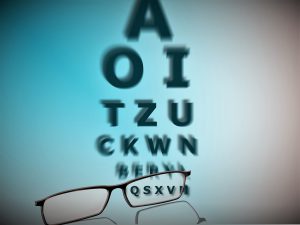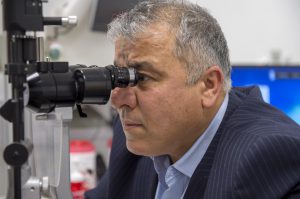Macular degeneration is a leading cause of vision loss in the US, especially in older adults. The risk of developing advanced age-related macular degeneration increases from 2% for those aged 50-59, to nearly 30% for those over the age of 75. That means it’s vitally important that you get your eyes checked regularly as you age, since doing so could help save your vision. August is National Eye Exam Month, so this month we wanted to talk about macular degeneration, how you can avoid this disease, and how Medicare can help.
Age-Related Macular Degeneration

The macula is the center of the retina, and is responsible for vision clarity. Over time the macula can thin, known as age-related macular degeneration (AMD), causing blurred or reduced central vision. This condition can develop in one or both eyes, but will eventually affect both eyes.
If you are diagnosed with macular degeneration, you will not lose your sight entirely, but you could lose your ability to read, drive, and even recognize faces. The best way to avoid macular degeneration as you age is to have regular eye exams. During exams, your ophthalmologist can detect the early signs of macular degeneration and find the best solutions for minimizing its effects.
Risk Factors
There are multiple risk factors for developing macular degeneration, including:
- Having a family history of AMD
- Being Caucasian
- Smoking cigarettes
- Eating a diet high in saturated fat
- Being overweight
- Having hypertension or high blood pressure
- Having heart disease and/or high cholesterol
- Being over the age of 50
Unfortunately, there is no cure for macular degeneration, but a healthy lifestyle can help reduce the risk of developing it, and can slow down its progression. For example, to reduce your risk of AMD, you should quit smoking if you are a smoker, exercise regularly, eat a healthy diet, and protect your eyes from UV rays with sunglasses and a hat.
Medicare Coverage for Macular Degeneration
If you begin to experience wavy, blurry, or dim vision, it’s important to contact your eye doctor immediately. If you are diagnosed with macular degeneration, treatment will depend on the stage of the disease. In the early stages, called dry macular degeneration, you will most likely be told to take supplements, which are generally not covered by Medicare.
But if your AMD is in a more advanced stage, known as wet macular degeneration, Medicare Part B will cover diagnostic tests and treatments, including drops and injections. You will, though, have to meet your Part B deductible first, as well as pay a 20% coinsurance for the Medicare-approved amount of the treatment.
Extra Coverage
Medicare Part B will only cover the cost of services or treatment for any condition at 80%, leaving you to pay for the other 20% out-of-pocket. If you need ongoing treatment for a condition like macular degeneration, this can become quite expensive, especially if you are living on a fixed income, as many Medicare beneficiaries are. Fortunately, though, you can save money on all your medical expenses and get extra coverage by purchasing a Medicare Supplement Plan.
There are 10 different Medicare Supplement Plans to choose from, each offering different coverage options and rates. It’s worth looking into a Medicare Supplement Plan to save as much money as you can, so speak to an EZ agent for all of your options. EZ’s agents work with the top-rated insurance companies in the nation and can compare plans for you in minutes at no cost to you. To get free instant quotes for plans that cover your current doctors, simply enter your zip code in the bar on the side, or to speak to a licensed agent, call 888-753-7207.